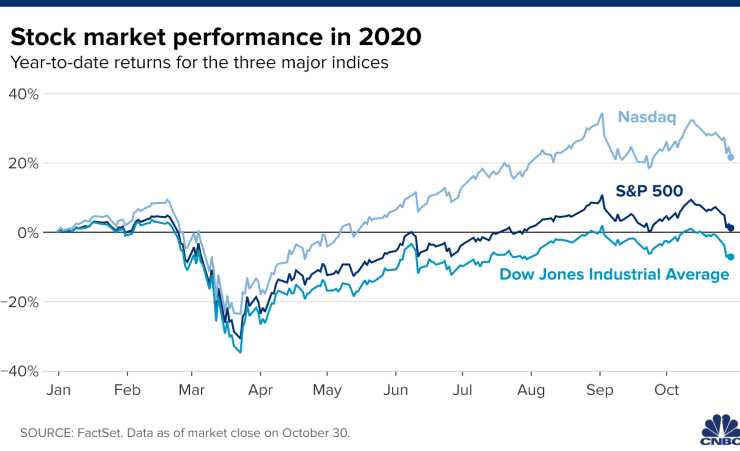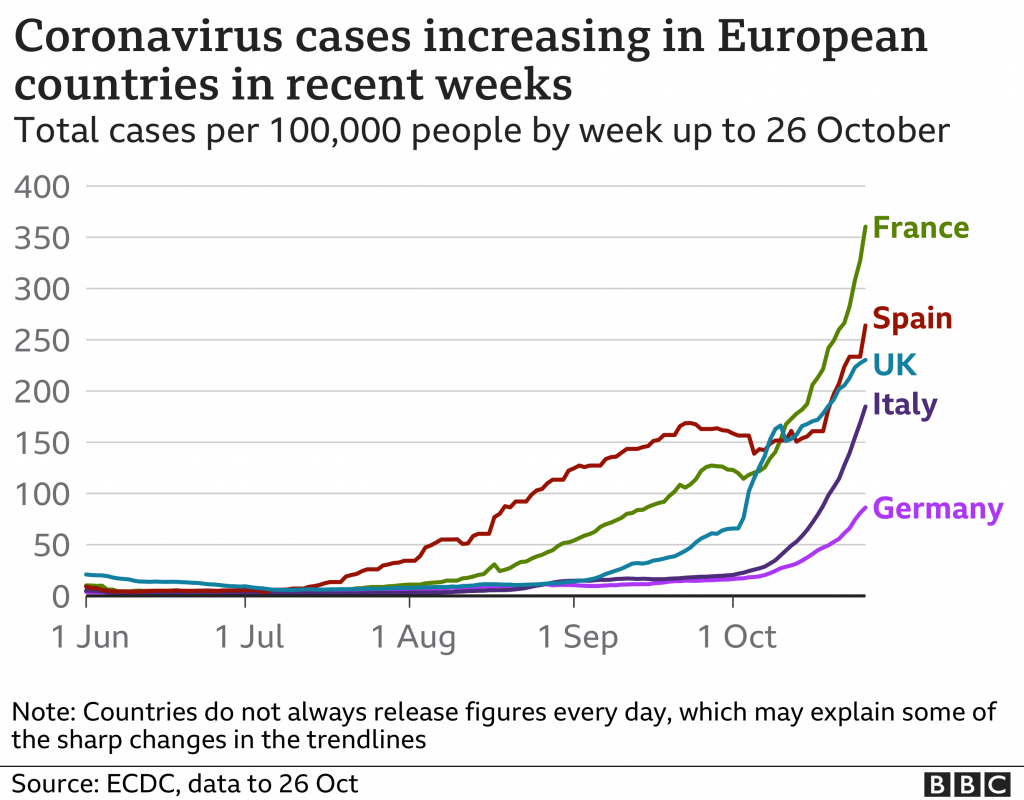U.S. Coronavirus Cases Hit New High as Germany, France, and Britain Lockdown Again
Disclosure: We are reader-supported. If you purchase from a link on our site, we may earn a commission. Learn more
Last Updated on: 1st November 2020, 10:27 pm

This past week saw the United States struggling with new high numbers of coronavirus cases. Thursday was a high water mark of 88,521 new cases per day elevating the revolving seven day average to a new peak of 76,590 according to Johns Hopkins University. In 41 of the 50 states, the rates of hospitalizations are rising. This occurred against a backdrop of similarly rising cases in Europe. Germany, France, and the United Kingdom have already engaged in modified second national lockdowns in an effort to save the Christmas holiday season later.
U.S. Hits New Highs in Numbers of Coronavirus Cases
On Friday previous FDA head Dr. Scott Gottlieb announced that the numbers of new coronavirus cases within the United States are rising in a trend eerily comparable to that seen in Europe now. Dr. Gottlieb warned that:
“If we get to the levels of some of the European countries like France, Italy, Spain, and the U.K. are experiencing, it's going to really press our health care systems across the country.”
Friday saw the U.S. reach a new all-time high for one day new coronavirus cases. Per an NBC News report, 97,088 new incidents of the virus were reported. This made the fifth new United States' tally high dating back to only Thursday, October 22nd. It also represented the second day in a row where over 90,000 new Covid-19 incidents appeared. The same NBC News report revealed 969 coronavirus deaths within the U.S. for Friday versus 982 deaths reported on the day before.
The top U.S. coronavirus expert Dr. Anthony Fauci warned that the United States' daily totals are now “extremely high and quite unacceptable,” especially with the winter flu season rapidly approaching. Some critics have called the most recent surge a third wave, but according to Dr. Fauci this is still a part of the original wave of Covid-19 infections. As the chart below reveals, the stock market has experienced tremendous volatility over the past year as this crisis has been ongoing:

Dr. Fauci warned Friday on the “Dr. Radio Reports” that:
“We never got out of the real wave. We kind of went up and down within a wave. When I hear people talk about second and third waves, it really is the original wave that just resurges up, comes down a little, and resurges up again. We're in a precarious position over the next several weeks to months.”
Per Johns Hopkins University research and database the United States has announced more than nine million cases in total from the first days of the global pandemic. A million of these cases have been added in just the middle of October.
Germany, France, and Britain Go Into New Lockdowns As Cases Rise Precipitously
The escalating numbers of cases of coronavirus in Europe have pushed the biggest economies there into renewed lockdowns. President Emmanuel Macron of France announced that he was instituting a second nationwide lockdown that will extend through the end of the month of November minimally. Under France's new rules, residents are only permitted to freely leave their homes to go to essential jobs or for medical purposes. Factories and schools stay open but bars, restaurants, and other so-called non-essential businesses are closing.
France's daily death toll from coronavirus has reached its greatest point dating back to April with 33,000 individual new cases having been confirmed Tuesday. President Macron declared that:
The country is risking becoming “overwhelmed by a second wave that no doubt will be harder than the first.” France has to “brutally apply the brakes” in order to avoid becoming “submerged by the acceleration of the epidemic. The virus is circulating at a speed that not even the most pessimistic forecasts had anticipated. Like in the spring, you will be able to leave your house only to work, for a medical appointment, to provide assistance to a relative, to shop for essential goods, or to go for a walk near your house.”
Half of the French hospital intensive care unit beds are now taken up by coronavirus patients. Because of this, social gatherings of all kinds have been outlawed. Forms have to be filled in to prove the reason for going out of homes like in the first lockdown back in March.
Yet all factories and providers of public services are to stay open so that the French economy will not collapse or come to a halt according to the French president. These measures have already taken effect and will last until December 1st. They will be reevaluated on bi-weekly basis. The hope from Macron is that families will be able to get back together for the Christmas holiday.
This chart below reveals how dramatically the Covid-19 cases have been multiplying throughout the major European nations over the last few weeks:

Germany is also establishing its own emergency form of lockdown that will not be as severe as the one in France. Restaurants, theaters, and gyms will close. Germany may boast a lower rate of infection that most places on the continent, but the virus has been advancing at an unexpected pace that has raised alarms in Berlin. German Chancellor Angela Merkel warned that the nation was forced to take action now in a “major national effort” that will battle the coronavirus spread with:
“Our health system can still cope with this challenge today, but at this speed of infection it will reach the limits of its capacity within weeks.”
The lockdown in Germany takes effect from November 2nd and will enable kindergartens and schools to stay open. Tourism will be stopped and all restaurants will only be permitted to serve takeaway while the bars will all be closed. The premier and her state premiers will hold a video conference November 11th to consider the situation again. According to Merkel, this is all critical in order to head off a national emergency. With daily infection rates rising to a new high mark of 14,964 and another 85 deaths reported over the most recent day period, the Germans are not taking any chances.
Second Wave Cases and Deaths Also Rising Across the British Isles
Besides the rising cases plaguing the continent of Europe, the United Kingdom is also suffering from higher incidents of coronavirus. On Wednesday this week the British government revealed that there had been another 310 deaths at the same time as there were 24,701 newly recorded cases. In fact Great Britain has logged over 20,000 additional cases every day over the last week. This brings the British total to over a million cases since the plague's inception. The death tally for Great Britain remains the greatest of Europe at 46,555.
In response to this rising spike in cases in Britain, Prime Minister Boris Johnson announced another lockdown that will extend for five weeks. It begins November 5th and concludes on December 2nd at which point the nation will go back to its tiered system that relies on the most recent data.
It came as little surprise that major markets around the world fell on the latest restrictions and second lockdowns announced. Wednesday saw the FTSE 100 in the U.K. decline by 2.6 percent while the German Dax cratered by 4.2 percent and the major American indices dropped by at least 3.4 percent.
European Commission President Ursula von der Leyen summed up the sentiment around Europe with:
“We are deep in the second wave. I think that this year's Christmas will be a different Christmas.”
Unfortunately the news from around the U.S. and Europe on the rising incidents of coronavirus is not great. It helps to explain why gold makes sense in a 401k. You can not do much to control the spread of Covid-19 or to shield markets from the effects of renewed lockdowns. You are able to consider partially diversifying your investment and retirement portfolios into IRA-approved precious metals. Before you consider any decisions, you should always read more about Gold IRA storage options and the top Gold IRA companies.



 Silver
Silver Gold
Gold Platinum
Platinum Palladium
Palladium Bitcoin
Bitcoin Ethereum
Ethereum

 Gold: $3,289.46
Gold: $3,289.46
 Silver: $32.98
Silver: $32.98
 Platinum: $1,048.32
Platinum: $1,048.32
 Palladium: $972.40
Palladium: $972.40
 Bitcoin: $105,153.29
Bitcoin: $105,153.29
 Ethereum: $2,542.54
Ethereum: $2,542.54